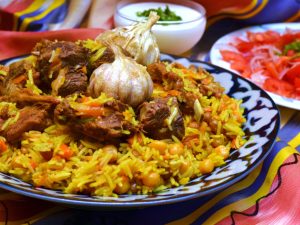
Uzbek palov, also known as osh palov, is a staple dish in the country of Uzbekistan.
This dish is served on almost every occasion with 200 different variations from each province. The occasions can range from happy to sad: circumcisions, Navruz, Eid, and funerals. However, it is frequently served at weddings that stems from a legend.

Afsona (legend) has it that a prince fell in love with a woman from an impoverished family. Not being able to marry her, the prince refused to eat in his depressive state. His father, the king, invited Ibn Sina (Avicenna), the great tabib (physician) of the East, an influential figure in Islamic history and modern science. He was invited to cure the prince. He believed the lovers needed to connect, and it should be through a high-calorie dish of palov to heal.
In Farsi, “osh” literally translates to soup or stew, and “palov” means any cooked rice. Each letter of the dish stands for the ingredients used in old Farsi. For “osh,” “o” stands for ob (water), and “sh” stands for sholi (rice). For “palov,” “p” stands for piyoz (onion), “a” is for ayoz (carrots), “l” for lahm (meat), “o” for oliyo (fat), and “v” for veet (salt).
Palov is served in an osh xona (palov house), and the cook of this dish is an osh paz. It is also seen in the common phrase of osh bo’lsin, which means “bon appetite.”
In modern times, osh palov became a staple dish of the Soviet Union, in which many SSR cultures learned how to make osh palov, known for its Russified word plov. If anyone were to ask an ex-Soviet what they think about palov, a unanimous response of adoration would come from them.
Osh palov is deeply rooted in cultural importance to Uzbekistan, from tales of love to a unison of adoration for it in the Soviet Union. The simple phrase of osh bo’lsin reminds us that palov symbolizes togetherness and that it isn’t just about nourishing the body but the soul.
